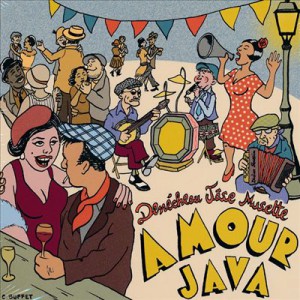 De musette is zowel een dans als een doedelzak of hobo. Dit alles heeft betrekking op Denécheau Jâse Musette. Een kwintet dat de musette speelt op beide muziekinstrumenten maar ook op accordeon aangevuld met gitaar, banjo en slagwerk. Een frisse benadering, soms licht archaïsch misschien, maar steeds opgewekt en vrolijk met vocalen van Ophélia Bard.
De musette is zowel een dans als een doedelzak of hobo. Dit alles heeft betrekking op Denécheau Jâse Musette. Een kwintet dat de musette speelt op beide muziekinstrumenten maar ook op accordeon aangevuld met gitaar, banjo en slagwerk. Een frisse benadering, soms licht archaïsch misschien, maar steeds opgewekt en vrolijk met vocalen van Ophélia Bard.
English version below
Frankrijk heeft al eeuwen een grote liedcultuur die begon in de Provence, 11de eeuw. Een cultuur die later verder werd ontwikkeld door troubadours en trouvères. Vanaf midden 19de eeuw komt er opleving van het Franse lied en zijn het de componisten Berlioz, Gounod en later Franck, Fauré, Ravel en natuurlijk Francis Poulenc die het lied, dat zij ‘melodie’ noemden, tot in de finesses verfijnden. Later ontstaat de populaire versie dat ‘chanson‘ is gaan heten, herkenbaar door zijn karakteristieke akkoord- en melodiegebruik. Deze ‘chansons‘ vinden we terug op de CD ‘Amour Java’ van Denécheau Jâse Musette van diatonisch accordeonist Daniel Denécheau. De groep speelt zowel instrumentale als gezongen ‘chansons‘ waar de accordeon steeds centraal staat, naast slagwerk, banjo, (slide)gitaar, doedelzak en effecten zoals vogelfluitje en kazoo. Het resultaat is spontane en onbevangen muziek, levendig met een hoog kermis en circus gehalte. Opvallend is Ophélia Bard die met haar onbevangen stem met alle gemak de liedjes zingt. Soms wordt ze bijgestaan door Robert Santiago en wordt er gezongen door een ‘megafoon‘ waardoor het allemaal nog levendiger klinkt. ‘Amour Java‘ is naast de titel van deze CD ook een compositie van de Franse accordeonist Émile Vacher (1883-1969). Een wals die hij schreef in 1931 met een mineur couplet en een majeur refrein. Een dualiteit die de kern is van deze muziek waar melancholie en plezier elkaar moeiteloos aanvullen. Oprecht gespeeld en gezongen door Denécheau Jâse Musette in een opgewekte entourage waar camembert, Franse wijn en baguettes niet zullen ontbreken!
English version
The musette is both a dance, a bagpipe and oboe. All this relates to Denécheau Jâse Musette. A quintet playing the musette on both instruments and accordion, supplemented with (slide) guitar, banjo and percussion. A fresh approach, sometimes slightly archaic perhaps, but always cheerful and upbeat with lovely vocals of Ophélia Bard
For centuries France has been a great country for the ‘song culture’ that started in Provence, 11th century, later on developed by minstrels and troubadours. From mid-19th century a revival of the French song started and composers like Berlioz, Gounod and later Franck, Fauré, Ravel and of course Francis Poulenc refined this vocal music culture. They called the songs ‘melodie’. The popular version of ‘melodie‘ is called ‘chanson’, recognizable by its distinctive chord and melody use. The ‘chanson‘ is to be found on the CD ‘Amour Java’ by Denécheau Jâse Musette of diatonic accordionist Daniel Denécheau. The group plays both instrumental and vocal ‘chansons’ with the accordion in the centre, next to percussion, banjo, slide guitar, bagpipes and effects such as bird whistle and kazoo. The result is spontaneous and uninhibited music, lively with a high fair and circus atmosphere. Remarkably is Ophélia Bard who sings the songs with such an ease with her natural voice. Sometimes she is assisted by Robert Santiago and vocals are sung through a ‘megaphone’, making it all sound even more vivid. ‘Amour Java‘ is next to the title of this CD, a composition by the French accordionist Émile Vacher (1883-1969). A waltz he wrote in 1931 with a verse in minor with a major chorus. This duality is the core of this music where melancholy and joy effortlessly complement each other. Sincerely sung and played by Denécheau Jâse Musette on cheerful locations where delicious camembert, French wine and baguettes will not be missing!
- Denécheau Jâse Musette: ‘Amour Java‘ (Buda Musique/Xango)

Geen reacties